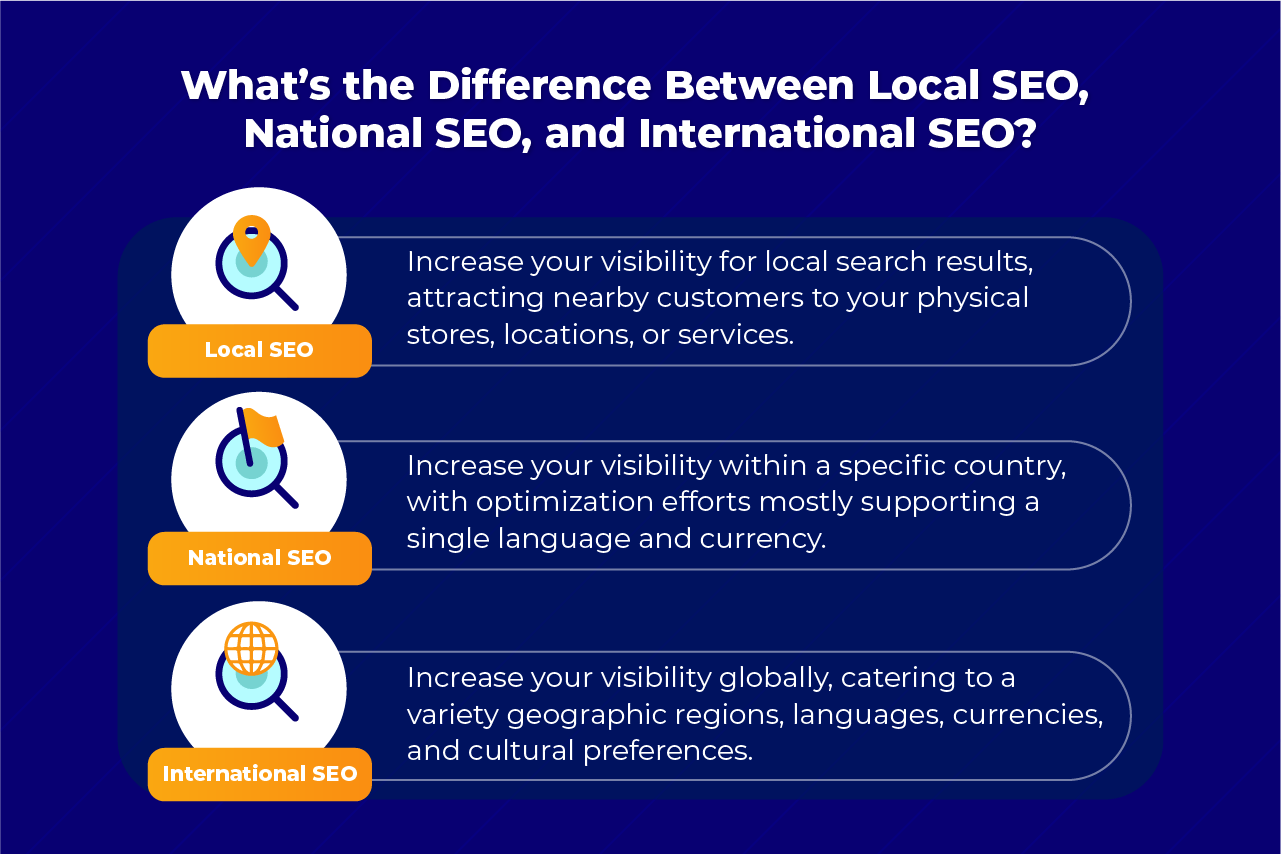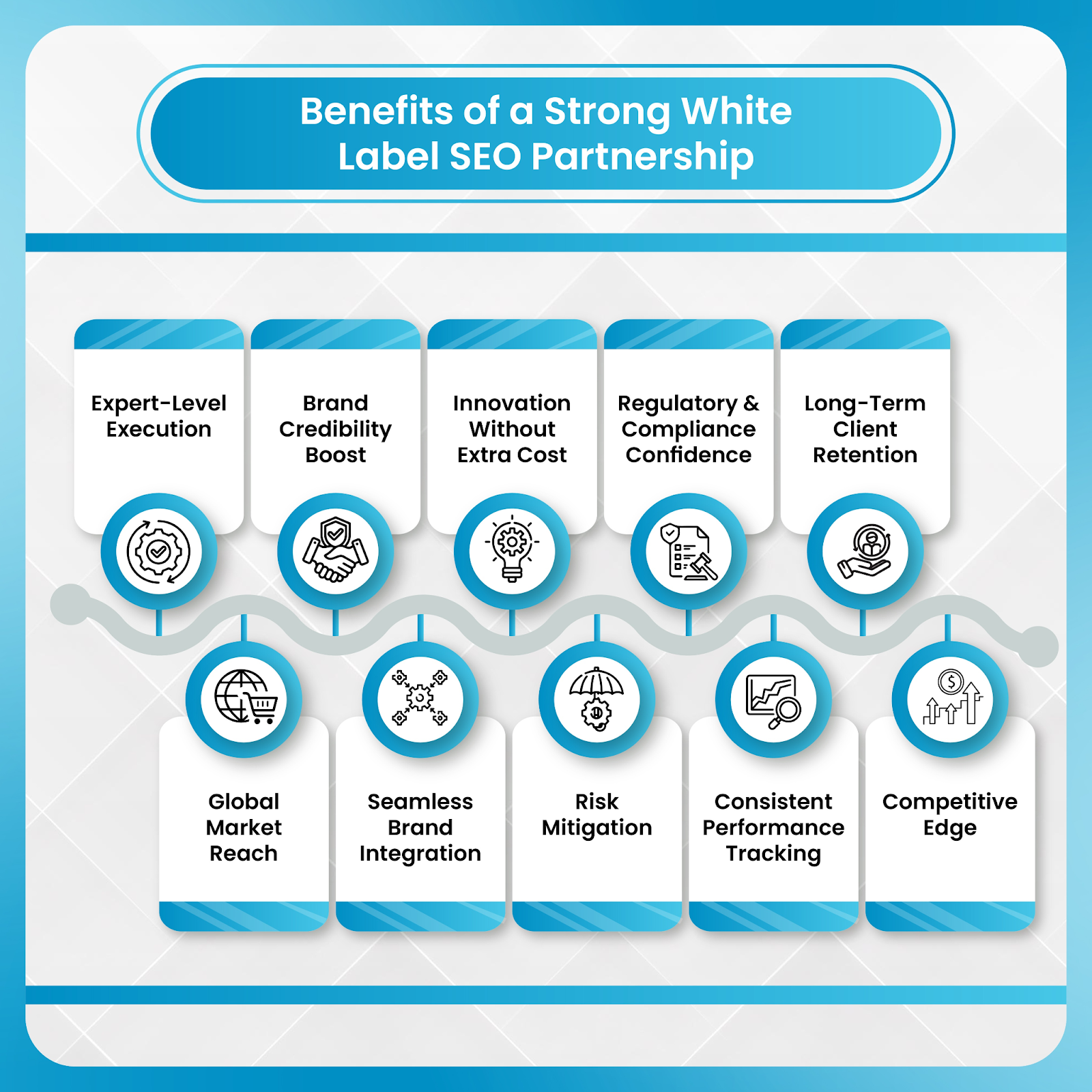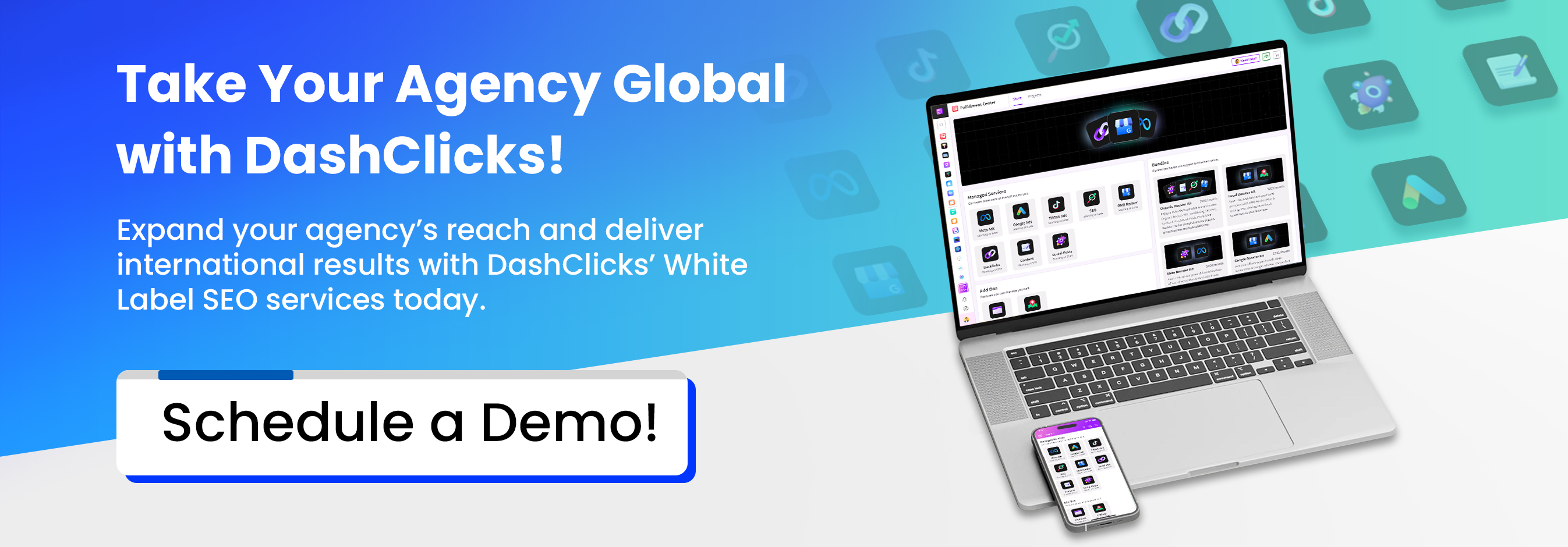For digital marketing agencies, growth often means looking beyond domestic borders. Attracting international clients is a hallmark of success, indicating that an agency possesses the capabilities and reputation necessary to compete on a global scale. However, this ambition comes with significant hurdles. Serving clients in different countries requires more than just a talented team; it demands deep, specialized knowledge of diverse markets, cultures, and search engine behaviors.
Many agencies quickly discover that the strategies that deliver results at home don't translate directly to international markets. From language barriers and cultural nuances to navigating unfamiliar search engines and complex regulations, the challenges are substantial. Without the right resources, agencies risk underdelivering, damaging their reputation, and losing valuable clients.
This is where white label SEO emerges as a powerful solution. By partnering with a specialized white label SEO agency, marketing firms can instantly access the expertise needed to deliver exceptional results for their international clients.
This model enables agency operations, offers a broader range of services, and confidently enters the global stage without the immense overhead of building an in-house international team. This guide explores how leveraging white label SEO services can empower your agency to overcome common obstacles and thrive in the global marketplace.
Why Your Agency Needs International SEO Clients?
Expanding your client base to include international businesses is not just about prestige; it's a strategic move that can fundamentally transform your agency's trajectory. Global clients bring a host of benefits that contribute to long-term stability and growth. According to recent industry reports, the global digital advertising and marketing market is projected to reach over $1 trillion by 2027, highlighting the immense opportunity available outside your local market.
Here are some of the key advantages of targeting international SEO clients:
- Significant Revenue Upside: International clients, particularly enterprise-level companies, often command larger marketing budgets. Their campaigns typically span multiple countries, leading to more comprehensive and lucrative projects. This allows your agency to secure higher-value contracts and increase your average revenue per client.
- Enhanced Client Retention and Recurring Revenue: International SEO is not a one-time project. It requires continuous monitoring, optimization, and adaptation to local market trends. This ongoing need for expertise creates long-term retainers, providing your agency with a stable and predictable stream of recurring revenue. High client retention rates are crucial for sustainable growth, and international clients often become your most loyal partners.
- Strategic Market Diversification: Relying solely on a domestic market exposes your agency to local economic downturns and market saturation. By diversifying your client base across different countries, you can mitigate these risks. A global portfolio ensures that a slump in one region is balanced by growth in another, creating a more resilient business model.
- Boosted Agency Reputation: Successfully delivering SEO results in multiple international markets positions your agency as a premium, globally-recognized provider. This enhanced reputation attracts more high-caliber clients, both domestic and international, and can make your agency a go-to choice for complex, multi-regional campaigns.
- First-Mover Advantage in Emerging Markets: Digital adoption is accelerating in emerging economies across Asia, Africa, and Latin America. By establishing a presence in these markets early, your agency can gain a significant first-mover advantage. Capturing market share before your competitors arrive can lead to long-term dominance and exponential growth opportunities. For instance, internet penetration in Southeast Asia has surpassed 80%, creating a massive new audience for businesses to target.

The Core Challenges of Serving International Clients
While the benefits are clear, the path to successfully serving international clients is filled with unique and complex challenges. Agencies that attempt to expand without the right expertise often find themselves unprepared for the intricacies of global SEO. These hurdles go far beyond simple language translation and require a deep understanding of local contexts.
Here are the primary obstacles agencies face when managing international SEO campaigns:
1. Language and Cultural Nuances
Effective SEO is about understanding user intent, which is deeply rooted in language and culture. A direct translation of keywords and content is rarely effective.
- Beyond Translation: Idiomatic expressions, semantic variations, and local slang play a crucial role in how users search. For example, a user in the UK searching for "holiday deals" has a different intent than a user in the US searching for the same term. One is looking for a vacation package, while the other might be looking for discounts around a public holiday.
- Cultural Context: Content must be culturally relevant to resonate with the target audience. A marketing message that is persuasive in one culture might be ineffective or even offensive in another. Visuals, tone of voice, and even the structure of content need to be adapted to local preferences.
2. Search Engine Differences and Algorithms
While Google dominates the search market in many parts of the world, it is not the only player. Key regional markets have their own preferred search engines with unique algorithms and ranking factors.
- Google vs. The World: In China, Baidu is the undisputed leader with over 70% of the market share. In Russia, Yandex is the dominant search engine. In South Korea, Naver holds a significant position. Each of these platforms has its own set of rules for indexing, ranking, and advertising.
- Lacking Local Expertise: Most agencies specialize in Google SEO and lack the in-house expertise to optimize for Baidu, Yandex, or Naver. Without this knowledge, they are unable to deliver meaningful results for clients targeting these regions.
3. Regional User Behavior and Preferences
How users interact with websites and consume content can vary dramatically from one country to another.
- Device Usage: Mobile-first indexing is a global trend, but the degree of mobile dominance varies. In many emerging markets, mobile is not just first; it's often the only way users access the internet. This requires a mobile-centric approach to web design and content delivery.
- Content and UX Expectations: User experience (UX) preferences are also culturally influenced. Some cultures prefer minimalist designs with plenty of white space, while others respond better to information-dense layouts. The path to conversion, including preferred payment methods and trust signals, also differs across regions.
4. Technical SEO Barriers
International SEO introduces a layer of technical complexity that many agencies are not equipped to handle.
- Hreflang and Canonicalization: Properly implementing hreflang tags is critical for telling search engines which version of a page to show to users in different regions. Errors in hreflang or canonical URLs can lead to duplicate content issues and incorrect page rankings.
- Global Site Infrastructure: Ensuring fast load times for a global audience requires strategic decisions about server locations and Content Delivery Networks (CDNs). A website that loads quickly in North America may be painfully slow for users in Australia or Japan without the right infrastructure.
5. Regulatory and Compliance Issues
Data privacy and consumer protection laws are becoming increasingly stringent worldwide, and non-compliance can result in hefty fines.
Navigating Global Regulations: The General Data Protection Regulation (GDPR) in Europe and the California Consumer Privacy Act (CCPA) are just two examples of complex data regulations that impact SEO strategies. Agencies must be knowledgeable about the specific laws in each country their clients operate in, which is a daunting task for non-specialists.

Image Source: Break The Web
The White Label SEO Solution: Overcoming Global SEO Hurdles
Partnering with a white label SEO agency provides a direct and efficient solution to these challenges. Instead of spending years and vast resources building an in-house international team, you can instantly leverage the expertise of specialists who already have the knowledge and tools to succeed globally. Here’s how white label SEO services empower your agency:
1. Multilingual Keyword Research and Intent Analysis
A white label SEO partner has teams of native-speaking SEO specialists who understand the subtle nuances of their local markets.
- They conduct precise keyword research that goes beyond literal translations, identifying high-intent keywords that local customers actually use.
- Using advanced tools and AI-assisted predictive research, they can also identify emerging trends and search behaviors in developing markets, giving your clients a competitive edge.
2. Localized Content Development
Effective international SEO requires content that is not just translated but truly localized.
- White label SEO providers create culturally relevant content that aligns with local search intent and resonates with the target audience.
- This includes adapting the tone, style, visuals, and even the format of the content to match local preferences. For example, while blog posts may be popular in one region, another may prefer video content or infographics.
3. Search Engine-Specific Optimization
A specialized white label SEO agency has dedicated teams for major international search engines.
- They provide tailored optimization for Baidu, Yandex, and Naver, understanding their unique ranking factors and submission processes.
- This includes implementing region-specific meta tags, structured data, and indexing practices to ensure maximum visibility on the platforms that matter most to your clients.
4. Expert Technical SEO and Infrastructure Management
White label SEO partners handle the complex technical aspects of international SEO, ensuring a solid foundation for your clients' global presence.
- They correctly implement hreflang tags, canonicalization, and multi-language sitemaps to avoid common pitfalls that can harm rankings.
- They also advise on and implement strategies for global site speed, such as choosing the right server locations and configuring CDNs for optimal performance in every target region.
5. Transparent, White-Labeled Client Reporting
Presenting results in a way that clients can understand and trust is crucial.
- White label SEO services provide fully customizable, white-labeled dashboards that highlight region-specific performance.
- Metrics are tailored to what matters most in each market, and reports can be presented in the client's native language, reinforcing your agency's professionalism and transparency.
6. Efficient Management of Multi-Country Campaigns
Running simultaneous campaigns across different markets can quickly overload an in-house team.
- White label SEO partners have established Standard Operating Procedures (SOPs) and automated workflows to manage complex, multi-country campaigns with efficiency and consistency.
- This allows your agency to scale its international offerings without having to scale its internal headcount, leading to greater profitability.

The Risks of Going It Alone
Attempting to manage international SEO without a specialized partner is fraught with risk. The learning curve is steep, and the cost of errors can be high. Agencies that try to handle it all in-house often face:
- Poor Keyword Targeting: A lack of multilingual expertise leads to targeting the wrong keywords, resulting in low-quality traffic and poor conversion rates.
- Missed Opportunities: An inadequate understanding of local search engines means your clients miss out on vast segments of their target audience.
- Resource Drain: The demands of creating localized content and implementing complex technical SEO can stretch your internal team thin, impacting the quality of service for all your clients.
- Damaged Client Relationships: Difficulty in managing client expectations across diverse regions and failing to deliver promised results can quickly lead to client churn and a damaged reputation.
- Costly Technical Errors: Simple mistakes in hreflang implementation or sitemap configuration can cause significant ranking drops and take months to fix.
Measuring the Success of International SEO Campaigns
To demonstrate the value of your services to international clients, it's essential to track the right metrics. A good white label SEO partner will provide you with comprehensive data and reports that showcase progress in each target market. Key Performance Indicators (KPIs) to monitor include:
- Organic Traffic by Region: Track the growth of organic traffic from each target country or language to demonstrate market penetration.
- Local Keyword Rankings: Monitor rankings for top keywords in each specific market.
- Click-Through Rate (CTR) and Conversion Rates by Region: Assess the quality of the traffic and its impact on the client's business goals.
- Engagement Metrics: Analyze bounce rate, session duration, and pages per session for each region to understand user engagement levels.
- Region-Specific Backlink Acquisition: Measure the success of link-building campaigns tailored to each market.
- Technical Health and Page Speed: Monitor Core Web Vitals and other technical health metrics on a per-country basis.
- Revenue and ROI by Market: The ultimate measure of success. Compare the revenue generated from each market against the cost of the white label SEO services.
- SERP Features and Visibility: Track visibility in local packs, featured snippets, and other rich results specific to each region.
By presenting this data in a clear, white-labeled dashboard, you can effectively communicate the value you are delivering and build strong, lasting relationships with your international clients.
How DashClicks Streamlines International SEO Fulfillment?
Platforms like DashClicks are designed to make white label SEO services seamless and scalable. When an agency partners with DashClicks for international SEO, they gain access to a powerful, all-in-one platform that simplifies every aspect of the process.
Your agency can place orders for specific international SEO tasks—such as keyword research for the German market or Japan—and the work is executed by a vetted team of experts. The platform provides a centralized dashboard where you can track progress, communicate with the fulfillment team, and generate white-labeled reports for your clients.
DashClicks’ streamlined workflow allows your agency to manage multiple international campaigns simultaneously without being overwhelmed, ensuring consistent quality and transparent reporting under your own brand.
Your Gateway to Global Expansion
For ambitious agencies, the question is not whether to serve international clients, but how to do so effectively and profitably. The complexities of global SEO can seem overwhelming, but they don't have to be a barrier to growth. White label SEO provides a scalable, cost-effective, and expert-driven solution that empowers you to confidently expand your services across borders.
By partnering with a trusted white label SEO agency, you can offer world-class international SEO services under your own brand, delivering consistent quality and measurable results. This strategic partnership allows you to increase revenue, enhance client retention, and solidify your reputation as a leading global agency. Stop letting a lack of resources hold you back. It's time to unlock your agency's full potential and step onto the world stage.



.svg)

.svg)
.svg)
.svg)
.svg)
.svg)

.svg)




.svg)
.svg)
.svg)
.svg)
.svg)